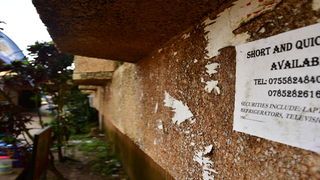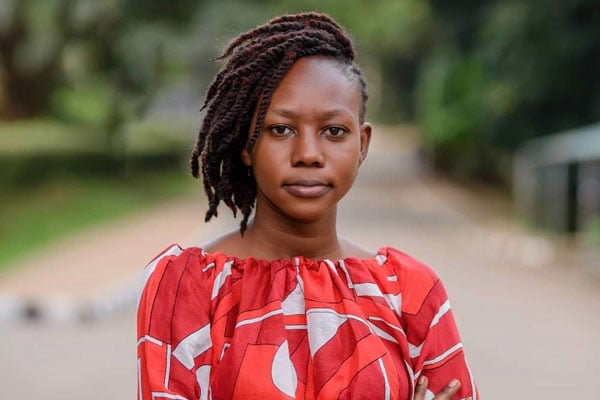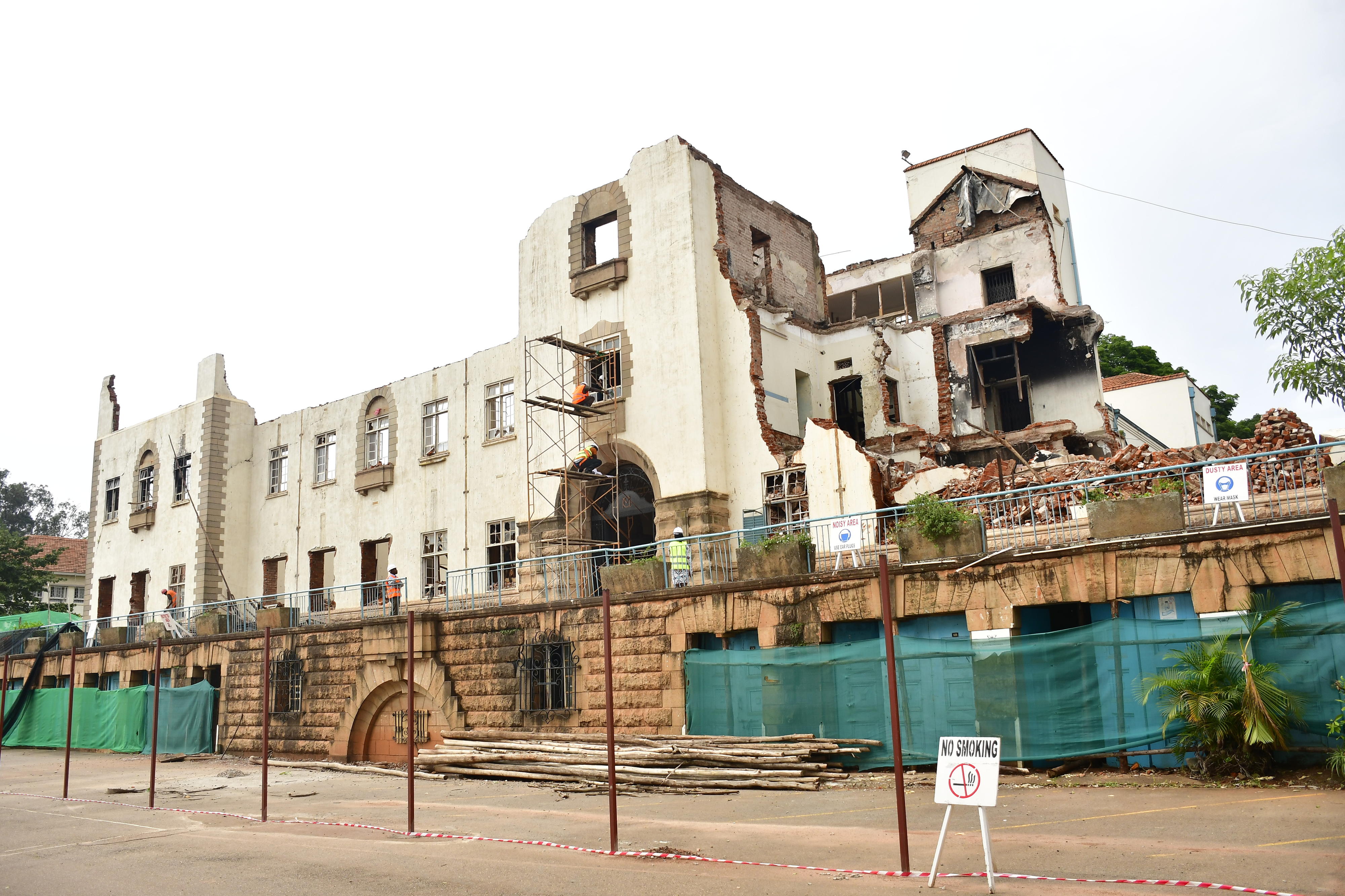
A money-lending poster at one of the halls of residence at Makerere University. PHOTO/ STEPHEN OTAGE
|Education
Prime
Makerere students gamble future to loan sharks
What you need to know:
- Lenders base at halls of residence or nearby hostels to get clients who are willing to trade their laptops, smartphones, and original academic documents.
Dozens of Makerere University students, estimated by some victims to gross 100, are choking on loans or have lost valuable assets to creditors in thriving on-campus money lending businesses.
Our investigations show that the lenders are not licensed by Uganda Microfinance Regulatory Authority (UMRA), not registered with the university and operate unregulated, leaving both the borrower and creditor at each other’s mercy and trust.
Whereas the quick loans have reportedly enabled thousands of students in financial distresses to access cash with speed to pay tuition, clear hostel and hall bills or afford necessities, even luxuries of life, many cheated in deals-gone-bad are regretting.
For example, Ms Winifred Kamuntu, while an undergraduate Bachelor of Commerce (External) student, staked her smartphone as collateral and picked Shs250,000, lower than the value of the handset, from a lender based at University Hall gate to clear the tuition balance ahead of end-of-semester examinations.
“But when I went back after one week [to pay the loan], I couldn’t find him (the lender) where he operated from at the University Hall gate. I kept on calling him, but his phone numbers were switched off and I never got through. That is how I lost my phone,” she said.
Ms Kamuntu had nowhere to report the case because she signed no documents while getting the loan. There is no record of the lenders at halls of residence or other university authorities.
Prof Barnabas Nawangwe, the Makerere University Vice Chancellor, told this publication that “many” money lenders operating on campus are doing so “illegally”.
“I am not in support of the money lending activity within the university premises since it may lead to loss of money and criminal tendencies,” he said.
Prof Nawangwe referred our additional inquiries to the Deputy Vice Chancellor in-charge of Academic Affairs, Dr Umar Kakumba, but he was unreachable on his mobile phone.
We were unable to establish whether the university has a policy to regulate money lending business on campus where creditors preferred collaterals including laptops, smartphones, and students’ original academic documents.
A borrower can pick up to Shs1m at 18-20 percent interest rate per month. Some of the lenders --- many stage at the university gates or gates to its halls of residence --- are fronts allegedly to be for some administrators at campus.
Student lenders on the other hand base at halls of residence or nearby hostels, according to our findings.
The attraction of the loans, a number of individuals who have benefitted, said included relative ease of access and available information through ubiquitous advertisements on building and trees. The advertisers rarely include names of the lending businesses, but include phone numbers to call for cash.
One such advert pasted on the wall of CCE Hall near the main university gate read: “Short and quick loans available. Telephone [withheld]. Securities include laptops, refrigerators, televisions, [mobile] phone [handsets] etc …”
Two telephone numbers listed on the advert were unavailable when we tried to reach the creditor on them.
The loans-on-dial businesses on campus have turned a relief as well as risk. Theft of on-demand collaterals have increased at the university, according to leaders who spoke on condition of anonymity.
In some cases where the value of the mortgaged asset is higher than the loan, as was the case for Ms Kamuntu, the lender vanishes and switches off the known telephone numbers.
Where staked collaterals are cheaper or stolen, it is the creditor’s troubles.
Mr Micheal Mutumba, the university chief security officer, without providing specifics, last evening confirmed that they have registered cases of some defaulting students forfeiting valuable assets.
Some of the students we spoke to revealed that they are compelled to borrow the money due to harsh economic times.
Mr Bright Obwon, a first-year Journalism and Communication student, said a money lender helped him pay his hostel fees.
“I had to give out my phone worth Shs600,000 so that I could get Shs400,000 to clear hostel fees. I paid the loan and got my phone back,” he said.
According to Mr Eric Rickie Alori, a third-year student of Social Sciences, money lenders should be allowed to operate on campus because they come in handy in moments of financial distress.
“Having students as money lenders is a blessing to the entire students’ fraternity because they understand the kind of financial struggles which students go through trying to clear tuition, hostel fees and food,” he said.
However, some of the students expressed concern that some lenders tend to disappear with students’ collateral and can never be traced because their details are not captured anywhere with the university management or the UMRA.
The Guild President, Ms Shamim Nambassa, confirmed that there are several loan sharks within the university but noted that most are students.
The Guild, she noted, has received no formal complaint from victim students about losing personal assets to students. “It is really tricky to regulate the money lending business within the university because it is a casual arrangement between the lender and borrower and students have benefited from this kind of arrangement,” Ms Nambassa said.
“So, even if they lost property to money lenders for failure to pay, I think they would feel guilty to report any case since they agreed to the terms,” she added.
The Uganda Microfinance Regulatory Authority was established to regulate, licence and supervise all the Tier Four Microfinance Institutions and Money Lenders in Uganda.
The authority was established by Section 6 of the Tier Four Microfinance Institutions and Money Lenders Act, 2016. It was set up to restore investor and consumer confidence in the microfinance industry.
The law
Section 84 of the Tier Four Microfinance Institutions and Money Lenders Act, 2016 prohibits anyone from conducting money lending business without a licence.
The executive director of UMRA, Ms Edith Tusubira, said the law only allows them to regulate institutions after satisfying all the requirements in terms of documentation.
Ms Tusubira said UMRA doesn’t regulate relationships where people lend money on trust and friendship basis.
She warned masqueraders that the law will catch up with them.
“Right now we don’t have details about the Makerere University money lending issue, but we will find out. People intending to borrow money should endeavour to look out for a UMRA licence at the offices of the money lender and if it’s not there, then that business is fake. But even after seeing the licence, borrowers should send it to us to ascertain if it wasn’t forged,” Ms Tusubira said.
Our investigations show that some influential university officials operate the loan schemes using proxies for fear of being detected by management.
We were told that fronts operate from the halls of residences and that hall wardens fear to question them for fear of being victimised or sacked.
This information was corroborated by two wardens, who preferred not to be named to speak freely.
They alleged that their earlier attempts to block the money lending business within halls hit a dead end after they started receiving threats from anonymous people.
“Money lending is a lucrative business within the university given its high population and it is not about to end because owners of those loan businesses get good money from it,” one of the wardens told this publication.
“They plant agents at halls of residences, especially students, and they are untouchable. We tried to raise an alarm over it, but we were ignored and we chose to look on,” the warden added.
The duo also corroborated accounts that some students have lost their property to lenders over failure to pay back the loan which they said accumulates due to high interest rates.
“Some students have lost their laptops over failure to pay back the loans and this is what is happening in other halls of residences,” the warden said.
They add that some students steal laptops and other property to use them as collateral security outside the university.
Some of the money lenders whom we attempted to speak to hang up their phones when we introduced ourselves as journalists. They did not answer our follow-up calls.
Mr Amos Kiiza is a student of Journalism and Communication who operates a money lending business called Amos Quick Loans Services.
“The reason I chose Makerere University as the centre of my business is because students are always in need of money and I am assured of clients,” he said.
Mr Kizza said he has found difficulties in processing a practicing licence for his money lending business, adding that he can’t take a defaulter to court since his business is illegal.
He said there are several challenges associated with money lending business within the university, including delayed payment, security and little capital.
“Delayed payment remains my biggest challenge. Some people bring collateral that they probably tried to sell and failed. So, they take a loan from me and deliberately fail to pay back. Also, some of my very close friends come to take loans from me and never pay back,” Mr Kizza said.
Mr Brian Matsiko, a former student and money lender at the university, told this publication that money lending is a very lucrative business on campus given the big number of potential clients.
Mr Matsiko’s money lending business has since established a company called Select Finance Limited. He boasts of having a successful business with a reliable clientele.
The highest amount he lends is Shs5m and the least Shs100, 000. But he offers more than Shs5m to his regular and trusted clients.
“For clients that have been regular, I sometimes extend up to Shs7m. At one point, I gave out Shs10m, but that was to someone I knew,” Mr Matsiko said.
What they say
Prof Barnabas Nawangwe, Vice Chancellor: “I am not in support of the money lending activity within the university premises since it may lead to loss of money and criminal tendencies.”
Edith Tusubira, executive director of Uganda Microfinance Regulatory Authority: “We don’t have details about the Makerere University money lending issue, but we will find out. People intending to borrow money should endeavour to look out for a UMRA licence at the offices of the money lender and if it’s not there, then that business is fake. But even after seeing the licence, borrowers should send it to us to ascertain if it wasn’t forged.”
READ MORE:
Shamim Nambassa, Guild President: “It is really tricky to regulate the money lending business within the university because it is a casual arrangement between the lender and borrower... So, even if they lost property to money lenders for failure to pay, I think they would feel guilty to report any case since they agreed to the terms.”






